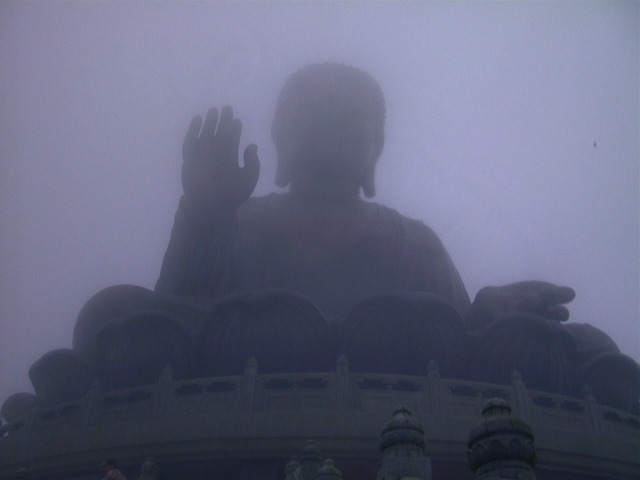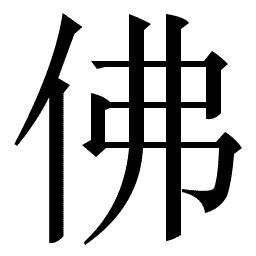His Holiness Hui Neng, who became the great Sixth Patriarch of Ch'an (Japanese Zen) was a poor
illiterate peasant boy from Hsin Chou of Kwangtung. One day, after he had delivered firewood to a
shop, he overheard a man reciting the following line from the "Diamond Sutra" - "Depending upon
no-thing, you must find your own mind." Instantly, Hui Neng became Enlightened. The full verse
said: "All Bodhisattvas (Compassionate Ones) should develop a pure mind which clings to no-thing
whatsoever; and so he should establish it."
The man who recited this sutra encouraged Hui Neng to
meet the Fifth Zen Patriarch, Hung Jen, at the Tung Chian
Monastery in the Huang Mei District of Chi Chou. Hui Neng
said to the Fifth Patriarch: "I am a commoner from Hsin
Chou Kwangtung (today, near Canton in the south of China).
I have traveled far to pay you respect, and I ask for nothing
but Buddhahood." "You are a native of Kwangtung, a
barbarian? How can you expect to be a Buddha?" asked the
Patriarch. "Although there are northern men and southern
men, north and south make no difference to their Buddha
Nature. A barbarian is different from Your Holiness
physically, but there is no difference in our Buddha Nature."
Master Hung Jen immediately accepted Hui Neng as his
disciple, but he had to hide this fact from the very educated
northern monks at the monastery. At the time of the Fifth
Patriarch, Ch'an was still influenced by Indian Buddhism,
which did not emphasize direct awakening, but the importance of study and metaphysical debates.
To protect Hui Neng, the Patriarch sent him to the kitchen to split firewood and pound rice for
eight months.
One day the Fifth Patriarch told his monks to express their wisdom in a poem. Whoever had true
realization of his original nature (Buddha Nature) would be ordained the Sixth Patriarch. The head
monk, Shen Hsiu, was the most learned, and wrote the following:
The body is the wisdom-tree,
The mind is a bright mirror in a stand;
Take care to wipe it all the time,
And allow no dust to cling.
The poem was praised, but The Fifth Patriarch knew that Shen Hsiu had not yet found his original
nature, on the other hand, Hui Neng couldn't even write, so someone had to write down his poem,
which read:
Fundamentally no wisdom-tree exists,
Nor the stand of a mirror bright.
Since all is empty from the beginning,
Where can the dust alight
The Fifth Patriarch pretended that he wasn't impressed with this poem either, but in the middle of
the night he summoned Hui Neng. The Fifth Patriarch gave him the insignia of his office, the
Patriarch's robe and bowl (source). Hui Neng was told to leave for the South and to hide his enlightenment
and understanding until the proper time arrives for him to propagate the Dharma.
NOTE: For more on Hui Neng and Shen Hsiu's two stanzas and the stanza competition please go to TRANSLATION NOTES
The monks were jealous and ignorant, believed that the transmission was material, and decided to
get back the robe and the bowl. After pursuing Hui Neng for 2 months, they found him on top of a
mountain and wanted to kill him. Their leader was Hui Ming, whose lay surname was Chen. Of all
the monks who pursued Hui Neng, he was the most skillful. Hui Ming had been a general of the
fourth rank, and was hot tempered and rough mannered. When Hui Neng was about to be
overtaken, he threw the robe and the begging bowl on a rock, quickly hid, and then said, "This
robe is nothing but a symbol. What is the use of taking it away by force?" When Hui Ming arrived
at the rock, he tried to pick up the robe and bowl, but was unable to do so. He cried out, "Lay
Brother, Lay Brother, " (for Hui Neng had not yet formally joined the monastic order), "I come for
the Dharma, not for the robe. " Hui Neng emerged from his hiding place and sat down on the rock.
Hui Ming made obeisance and begged him to teach. Hui Neng said, "Since the object of your
coming is the Dharma, refrain from thinking of anything and keep your mind empty. I will then
teach you." They meditated together for a considerable time, then Hui Neng asked Hui Ming,
"When you are thinking of neither good nor evil, at this particular moment, what is your original
nature (Buddha Nature)?" As soon as Hui Ming heard this, he instantly became enlightened. Hui
Ming then further asked, "Apart from those esoteric sayings and esoteric ideas handed down by
the Fifth Patriarch from generation to generation, are there any other esoteric teachings?" Hui
Neng replied, "What I can tell you is not esoteric. If you turn your light inwardly you will find
what is esoteric within you."
Hui Neng's statement was used as a Koan from then on - "what did your original face
look like before you were born? " Koans represent truths that can't be understood by logic. Hui
Neng's Koan cuts through concepts and speculations about one's nature. It is shocking to discover
that there is no concept which can fit such a question. The shock shakes one's assumptions, and
that begins the waking up process. As in his first poem, Hui Neng's original face is empty:
"When you hear me speak of emptiness, don't become attached to it, especially don't become
attached to any idea of it. Merely 'sitting' still with your mind vacant, you fall into notional
emptiness.
The boundless emptiness of the sky embraces the 'ten thousand things' of every shape and form -
the sun, moon and stars; mountains and rivers; bushes and trees; bad people and good; good
teachings and bad; heavens and hells. All these are included in emptiness.

The emptiness of your original nature (Buddha Nature) is just like that. It too embraces
everything. To this aspect the word 'great ' applies. All and everything is included in your own
original nature."
Hui Neng later became The Sixth Patriarch, the
founder of the Dhyana (Ch'an) School of Sudden
Awaking, which emphasized that sudden Enlightenment
was possible, given the right teacher and method. The
Sixth Patriarch's teaching emphasize non-duality and
oneness of everything. Hui Neng became the most
famous Ch'an (Zen) master in Chinese history. After
his death, his works were collected and classified as the
only Chinese Buddhist sutra, called The Sixth
Patriarch's Platform Sutra. His new school of Sudden
Awaking is the only major surviving Dhyana School of
Chinese Buddhism. Later, Hui Neng's disciples spread
the Dharma all over Asia. Hui Neng defined Sitting
Ch'an as: "In the midst of all good and evil, not a thought is aroused in the mind - this is called
Sitting. Seeing into one's original nature, not being moved at all - this is called Ch'an." He taught
that Sitting Ch'an should be practiced at all times, not just during formal sitting. He stressed it is
the attitude of mind that is important, and not the physical posture, because truth can be found
standing, walking, or lying down. In Japanese Sitting Ch'an was called Zazen.
D.T. Suzuki writes in An Introduction to Zen Buddhism:
Zen in not a system of Dhyana as practiced in
India and by other Buddhist schools in China. Dhyana is
generally understood to be a kind of meditation or contemplation
directed toward some fixed thought; in Hinayana Buddhism it was a
thought of transiency, while in the Mahayana it was more often
the doctrine of emptiness. When the mind has been so trained as
to be able to realize a state of perfect void in which there is
not a trace of consciousness left, even the sense of being
unconscious having departed; in other words, when all forms of
mental activity are swept away clean from the field of
consciousness, leaving the mind like the sky devoid of every
speck of cloud, a mere broad expense of blue, Dhyana is said to
have reached its perfection. This may be called ecstasy or
trance, or the First Jhana, but it is not Zen. In Zen there must be not just Kensho, but Satori. There
must be a general mental upheaval which destroys the old
accumulations of intellection and lays down the foundation for new
life; there must be the awakening of a new sense which will
review the old things from a hitherto undreamed-of angle of
observation. In Dhyana there are none of these things, for it is
merely a quieting exercise of mind. As such Dhyana doubtless has
its own merit, but Zen must be not identified with it.
(source)
The most important point in the teaching of the Dhyana (Meditation, or Ch'an) School lies in
Introspection, which means the turning of one's own 'light' to reflect inwardly. To illustrate, let us
take the analogy of a lamp. We know that the light of a lamp, when surrounded by a shade, will
reflect inwardly with its radiance centering on itself, whereas the rays of a naked flame with diffuse
and shine outwardly. Now when we are engrossed with criticizing others, as is our wont, we hardly
turn our thoughts on ourselves, and hence scarcely know anything about ourselves. Contrary to
this, the followers of the Dhyana School turn their attention completely within and reflect
exclusively on their own 'real nature,' known in Chinese as one's original face.'
Lest our readers should overlook this important passage, let it be noted that in China alone
thousands of Buddhists have attained Enlightenment by acting on this wise saying of the Sixth
Patriarch.
THE CODE MAKER, THE ZEN MAKER
OF SHANGRI-LA, SHAMBHALA, GYANGANJ, BUDDHISM AND ZEN
SRI RAMANA MAHARSHI: THE LAST AMERICAN DARSHAN
RECOUNTING A YOUNG BOY'S NEARLY INSTANT TRANSFORMATION INTO THE ABSOLUTE DURING HIS ONLY DARSHAN WITH THE MAHARSHI
HUI SHEN:
BHIKSHU
Fundamentally, our experience as experienced is not different from the Zen master's. Where
we differ is that we place a fog, a particular kind of conceptual overlay onto that experience
and then make an emotional investment in that overlay, taking it to be "real" in and of itself.

(PLEASE CLICK)
CODE OF ETHICS FOR SPIRITUAL GUIDES
FIVE QUALITIES OF A DHARMA TEACHER
SPIRITUAL GUIDES: PASS OR FAIL?
FALSE GURU TEST
CLICK
HERE FOR
ENLIGHTENMENT

ON THE RAZOR'S
EDGE
SEE ALSO:
BODHIDHARMA: The First Patriarch of Zen
E-MAIL
THE WANDERLING




